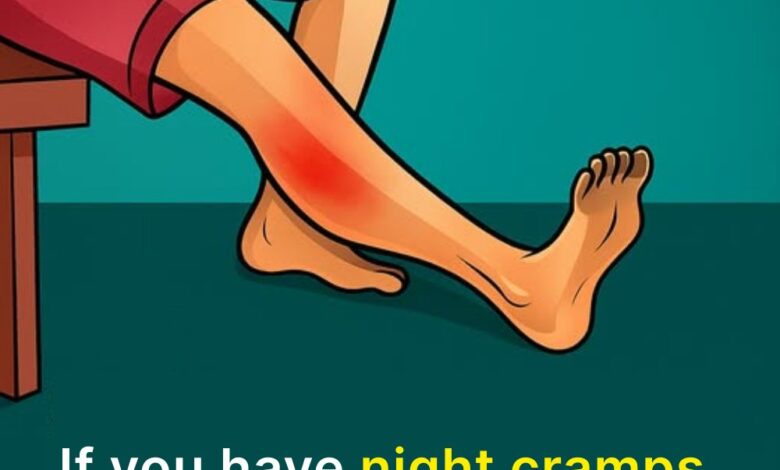
Nighttime cramps, often referred to as nocturnal leg cramps or “calambres”, are a frustrating and painful experience that can jolt you awake in the middle of the night. These sudden, involuntary muscle contractions usually affect the calves, feet, or thighs and can last anywhere from a few seconds to several minutes. Even after the cramp subsides, lingering soreness can remain for up to an hour, leaving you restless and unable to get back to sleep.
If you’ve ever wondered why these cramps happen and what you can do to prevent them, you’re not alone. Millions of people—particularly adults and seniors—deal with this problem on a regular basis. Understanding the underlying causes and learning how to ease or prevent them can make a significant difference in both comfort and sleep quality.
Why Nighttime Cramps Happen
There isn’t one single reason behind nighttime cramps. Instead, several factors can contribute to the problem:
- Intense physical activity: Pushing your body too hard during exercise, particularly without proper warm-up or cool-down routines, can strain muscles and trigger cramps later during rest.
- Overworked muscles: Standing for long periods, repetitive movement, or even wearing the wrong shoes can overload certain muscles, making them prone to spasms at night.
- Sedentary lifestyle: Ironically, being too inactive can also cause cramps. When muscles remain unused, they become stiff and less efficient, which can lead to cramping.
- Dehydration: Water plays a critical role in muscle function. Even mild dehydration can disturb the balance of electrolytes like sodium, potassium, and magnesium—key players in muscle contraction and relaxation.
- Aging: As we grow older, our muscles lose elasticity and strength, making cramps more likely to occur.
- Pregnancy: Many women experience frequent cramps during pregnancy due to hormonal changes, increased weight, and circulation shifts.
- Dietary imbalances: Low levels of magnesium, potassium, or calcium can heighten the risk of cramps.
Immediate Relief for Cramps
When a cramp strikes in the middle of the night, the priority is to relieve the pain quickly. Here are some effective methods:
- Stretching the muscle:
- For calf cramps: Sit down, extend the leg, grab the end of your foot, and gently pull it toward you until you feel the stretch.
- For foot cramps: Sit and stretch your toes outward slowly and firmly.
- For thigh cramps: Lie on your back, bend your knee, and pull the leg gently toward your chest for about 20 seconds.
- Massage: Firmly but gently massaging the affected muscle can stimulate circulation and encourage relaxation.
- Heat therapy: Applying a warm compress or heating pad to the cramped area helps relax tight muscles.
- Warm baths: Soaking in warm water can ease muscle tension and reduce the chance of recurring spasms.
Long-Term Prevention
Addressing the root causes of nighttime cramps is key to reducing how often they occur. Adopting healthier routines can help prevent them from disturbing your rest:
- Stay hydrated: Drink enough fluids throughout the day. Dehydration is one of the most common and preventable causes of cramps.
- Warm up before exercise: Preparing muscles with light stretches and warm-ups reduces strain and prevents nighttime repercussions.
- Stretch regularly: Include daily stretching sessions, especially before bed, to keep muscles flexible and resilient.
- Eat a balanced diet: Make sure your meals include foods rich in electrolytes like bananas, leafy greens, nuts, seeds, dairy, and fish. These nutrients play a central role in healthy muscle function.
- Avoid overexertion: Intense or prolonged activity can overwork muscles. Listen to your body and allow for adequate rest and recovery.
- Wear supportive footwear: Poorly fitted shoes or lack of support can strain the feet and calves, increasing the risk of cramps.
- Consider supplements: If dietary adjustments aren’t enough, supplements containing magnesium, potassium, or calcium may help. Always consult a healthcare professional before starting any supplementation.
The Bigger Picture
Nighttime cramps are not usually a sign of a serious health problem, but they can significantly disrupt your quality of life if they happen often. In rare cases, persistent cramps may be linked to circulation issues, nerve problems, or certain medications. If cramps become frequent or severe, consulting a doctor is recommended to rule out underlying conditions.
By making practical lifestyle changes—hydration, nutrition, stretching, and moderation—you can reduce the intensity and frequency of cramps. Pairing preventive steps with immediate relief strategies allows you to regain control over your nights and wake up feeling rested instead of sore.
In the end, nighttime cramps may be common, but they don’t have to control your life. With awareness and consistent self-care, you can ease the pain, protect your muscles, and reclaim the peaceful sleep your body deserves.